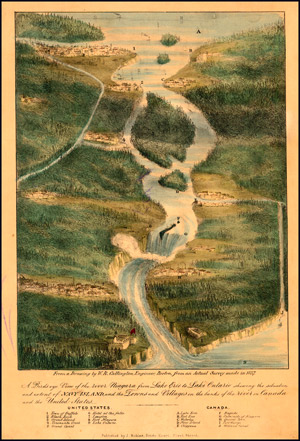Big old puddles
Sep 11, 2009
The Great Lakes are basically big puddles that filled with meltwater after the last Ice Age; to this day, almost all the rivers that feed the lakes come in from the north, where the glaciers used to be.
We could think of the Great Lakes as five bowls set on a staircase, each bowl brimming over and cascading down into the next. By the time the water slops over from the fourth bowl--Lake Erie--down to the last one--Lake Ontario--it's really spilling seriously, all fast and furious. And so we have Niagara Falls: an entire Ice Age of fossil water, draining down through four Great Lakes and then crashing hard through a narrow little riverbed to splash into that one last lake and then the St. Lawrence River and finally the Atlantic Ocean.
When European explorers first glimpsed Niagara, its connection to the two huge lakes seemed obvious and dramatic. This 1837 bird's eye view puts Lake Erie at the top, the falls in the middle, and Lake Ontario at the bottom of the picture, collecting all that splashover from ten thousand years of melting ice.
